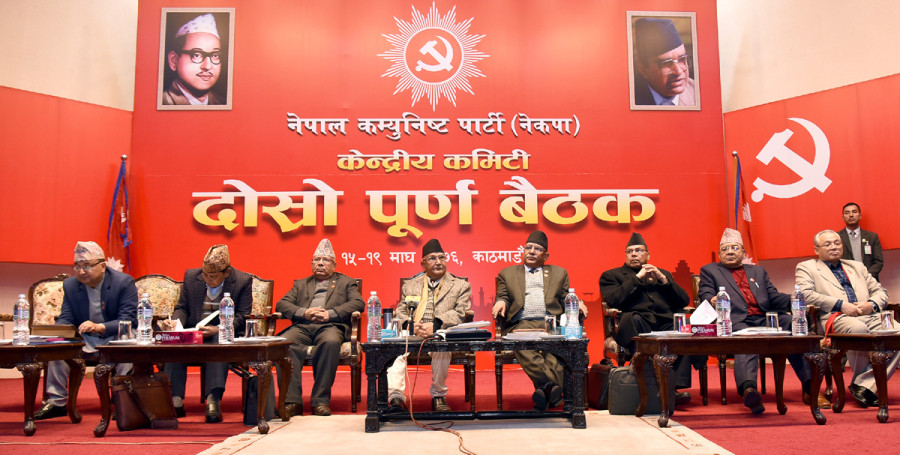Politics
Central committee members take top leadership to task over corruption and exclusion
Most of the 15 groups formed to facilitate discussions spoke about the failure of the Oli administration to control corruption and ensure representation.
Tika R Pradhan
At the Nepal Communist Party’s central committee meeting on Wednesday, as Prime Minister and party co-chair KP Sharma Oli was listing out the achievements his government had made over the past two years, a number of leaders in attendance could be glimpsed sleeping.
As this was early in the day and Oli was the first speaker, many questioned whether the central committee members were being disrespectful to the party co-chair, but those who were caught napping say they couldn’t help it.
“I had no patience for his long and boring statement about the government’s achievements which the people have never felt,” said one central member who asked not to be named as she feared reprisals. “I preferred to rest instead.”
The somnolence of leaders at Wednesday’s meeting was just one example of how dissatisfied central committee members are with the top leadership of the party—a dissatisfaction that continued well into Friday.
Most party leaders have questioned the failure of the Oli-led government on various issues.
“A major issue raised at most of the 15 groups formed for discussion was the failure of the Oli administration,” said Yubaraj Bhattarai, another central committee member.
The Oli administration has failed on several fronts, said critical leaders—on corruption and on ensuring an inclusive state. Despite Oli’s claims of good governance, leaders said that corruption was rampant at the local level, as the central government had failed to control graft.
Leaders also took particular issue with Oli’s strident defence of its dealings with the Yeti World business conglomerate, which is referred to as the ‘Yeti Group’ in the Nepali press. Central committee members said that Oli’s defence of one business group was unwarranted.
“It was unfortunate that the country’s prime minister had to stand for the defence of one business group,” said Rachana Khadka, a central committee member. “Most of the members of our group condemned the way the prime minister tried to cover up for a business house.”
The ongoing central committee meeting is taking place in 15 groups of around 30 members each. Various discussions are taking place in these groups, including one particular debate over the electoral system and how that is facilitating corruption. Party leaders said that elections have gotten much too expensive and the money raised to contest elections is being repaid via graft.
“Most leaders said that the election system was the root cause of all the ills in our democratic practice,” said Devendra Parajuli, also a central committee member. “We must change the existing system and find ways to make the elections less expensive.”
The criticism of expense of elections and Oli’s defence of Yeti World pointed to the central committee members’ larger concerns regarding financial transparency and corruption.
Many leaders, including Lekhnath Neupane and Hemraj Bhandari, proposed that the financial and property details of all central committee members be made public in order to facilitate transparency in the party.
“We have also proposed a rule where leaders who have investments in health and education won’t be eligible to become central committee members or get election tickets to become lawmakers,” said Bhandari.
However, as many of the central members are involved in such businesses, this proposal is not likely to be heard, he said.
While deliberating his group’s conclusions, group leader Neupane even proposed that the meeting form a powerful commission to look into the property details of all party leaders.
Outside of financial transparency, the central members also took issue with the party leadership’s abandonment of the constitutional provision for proportional representation. A large number of central committee members criticised the party and the government for failing to ensure representation not just in government bodies but also within the party. The party’s Standing Committee includes just two women while its Secretariat has no women.
“The government of Bagmati Province has no women representation while the Constitutional Council, which makes major constitutional appointments, has no representation from the Madhes,” said Lekhnath Neupane, another central member. “The issue of proportional representation within the party and the government bodies will be raised strongly in this meeting.”
Ruling party leaders had promised the Election Commission to ensure inclusiveness in all its major party committees at the upcoming national convention after the Commission had initially refused to register the unified party. The constitution and the Political Party Act both mandate proportional representation on all governmental and party bodies.
The meeting of the 445-member central committee is taking place after 20 months, despite the party statute clearly stating that the meeting of the communist party’s most powerful body should be held every six months. At the meeting, the two co-chairs, Oli and Pushpa Kamal Dahal, both conducted a self-criticism for not holding the meeting on time. The meeting is expected to continue until Sunday.




 10.12°C Kathmandu
10.12°C Kathmandu















